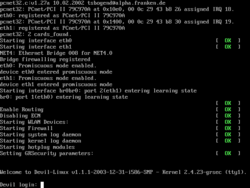- Devil-Linux
-
Devil-Linux 
Devil Linux Login ScreenCompany / developer DL team OS family Linux Working state Current Source model Open source Latest stable release 1.4.1 / December 16, 2010[1] Kernel type Monolithic kernel Official website www.devil-linux.org Devil-Linux is a Linux distribution for use as a router/firewall which boots and runs completely from CD-ROM. Devil-Linux is capable of running on an older PC. This, combined with a hub or switch is a solution some Linux users may prefer instead of using a dedicated router.[citation needed]
Devil-Linux does not provide a graphical interface, making it a very light-weight distribution. Nevertheless, it includes a wide range of services (E.g.: DNS, Web, FTP, SMTP, ...), tools (MySQL, Lynx, Wget, ...) and security utilities (OpenVPN, Shorewall, ...) ensuring a high level of flexibility. Saving the configuration to a (later write protected) floppy disk, the settings can be restored at boot. Without using writable media, Devil-Linux is extremely secure from outside attacks.[citation needed]
Devil-Linux uses a Linux from Scratch (LFS) build system that allows the user to create customized versions of this distribution.[clarification needed]
It uses the grsecurity kernel-patch.
Contents
Full software list
- AIDE - Advanced Intrusion Detection Environment
- Apache HTTP Server 2
- Apcupsd - A daemon for controlling APC UPSes
- Arpwatch - tool that monitors ethernet activity
- AWStats - Free log file analyzer for advanced statistics
- CIPE - encrypted IP in UDP tunneling
- cron - Scheduled command execution for your server or workstation
- cURL - command line tool to automate unattended file transfers or sequences of operations
- DenyHosts - a script intended to help thwart SSH server attacks
- ez-ipupdate - a client for automatically updating your IP address on the EZ-IP.net
- HA - High Availability (Heartbeat)
- hostapd - is a user space daemon for access point and authentication servers
- iproute2 - is a collection of utilities for controlling TCP / IP networking and traffic control
- IPsec-Tools -
- Jailkit - a set of utilities to create chroot shells or chroot daemons
- l2tpd - Layer 2 Tunneling Protocol Daemon
- LCD4Linux - a small program that grabs information from the kernel and displays it on external LCD
- logrotate - is designed to ease administration of systems that generate large numbers of log files
- Logwatch - is a customizable log analysis system
- lpd - Line Printer Daemon protocol
- SpamAssassin - A mail filter, written in Perl, to identify spam using a wide range of heuristic tests on mail headers and body text.
- Mgetty + Sendfax - a reliable and proven fax send and receive solution
- MRTG - Multi Router Traffic Grapher
- Nagios - a popular open source computer system and network monitoring application software.
- nameD - DNS Daemon
- Ntop - tool that shows the network usage, similar to what the popular top Unix command does.
- NTP - Network Time Protocol
- OpenLDAP - implementation of the Lightweight Directory Access Protocol (LDAP)
- pam.d - Pluggable Authentication Modules
- Postfix - mail transfer agent (MTA), a computer program for the routing and delivery of email
- PPP - Point-to-Point Protocol commonly used to establish a direct connection between two nodes.
- RADb - a public registry of routing information for networks in the Internet.
- Samba - provides file and print services to all manner of SMB/CIFS clients, including Windows
- Sarg - Squid Analysis Report Generator
- SASL2: Simple Authentication and Security Layer
- scponly is an alternative 'shell' for providing access to remote users to both read and write local files without providing any remote execution privileges
- SER - SIP Express Router, a high-performance, configurable, free SIP server
- Shorewall -a high-level tool for configuring Netfilter.
- Snort - intrusion detection/prevention
- SOCKS - an Internet protocol that allows client-server applications to transparently use the services of a network firewall.
- SSH - is a network protocol that allows data to be exchanged over a secure channel between two computers
- SSL - Secure Sockets Layer, a communications protocol
- UPS - Automatic Shutdown
- VMware Tools - package enhances graphics and mouse performance in virtual machines
- WLAN - is a wireless local area network[clarification needed]
- Zebra - routing software
See also
References
External links
- Devil Linux website
- Devil-Linux at DistroWatch
- Devil-Linux at Freecode
Linux distributions Arch Linux · CentOS · Debian · Fedora · Gentoo · Knoppix · Linux Mint · Mandriva Linux · Red Hat Enterprise Linux · Slackware · SUSE · Ubuntu · more…Comparison • List 
This Linux distribution-related article is a stub. You can help Wikipedia by expanding it.
